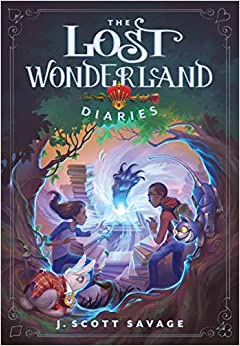Something monstrous has been found in the magic world of Wonderland and it wants to get out.
I got the opportunity to interview Mr. Savage about his newest adventure and am so excited to share his answers with all of you, but first... here's the synposis:
Lewis Carroll created a curious and fantastical world in his classic book Alice in Wonderland, but he secretly recorded the true story of his actual travels to Wonderland in four journals which have been lost to the world...until now.
Going back to Celia, we learn almost instantly that she is a math genius that she despises the library (despite the fact that her mom is a librarian), and then we learn why: she has dyslexia. Can you tell us why you picked dyslexia? And if you have any connection to it?
One of my favorite things about the original Alice books is that Lewis Carroll chose to have a young girl as a narrator. This was groundbreaking. There were young girls in books before that, but never as the main character narrating her own story.
Growing up as a child with undiagnosed ADHD, I wanted to put a neurodiverse character as the narrator of this books. While there are some great kids’ books with dyslexic main characters, most of them are boys. I have a very close friend whose daughter was dyslexic, and I got to hear firsthand about what she learned from it and what she struggled with. That’s a huge part of why I created Celia.
Ultimately, I wanted to show that even though kids are sometimes ashamed about their differences, they usually discover that those differences are a huge part of what makes them great.
There are so many things to love about The Lost Wonderland Diaries, including a fun mixture of imaginative word play and math puzzles. As a kid, were you more drawn to books and imagination, or math and science?
100% books! I loved books and was always daydreaming about fantasy creatures and far-off worlds.
I have to admit, I was not as familiar with Lewis Carroll’s Alice’s Adventures in Wonderland, having grown up on the Disney adaption. Still, reading The Lost Wonderland Diaries, I felt like I was in the Wonderland I was familiar with. How did you balance creating a place for readers like me (with little knowledge of the original Wonderland), with creating a place that avid fans would love?
Almost as soon as I started writing the book, I realized I had to appeal to three groups of readers. People who had never seen or read about Alice and her adventures, people had seen the movies, but didn’t know the books as well, and hard-core Lewis Carroll fans.
My first pass was trying to write in the world Lewis Carroll created, using a style that felt like his books. I included lots of nods and easter eggs for the experts, while including a lot of the classic characters for people who knew the movies. My second pass was adding elements that didn’t exist in the original books, but still had a place in that world. My third pass was having Tyrus tell explain to Celia what was from the books/movies and what had changed. I hope a created a story that you can read without any Alice knowledge and still enjoy. Then, maybe after reading my book, you can go back to the originals and discover some of the subtler nods.
Wonderland is full of mysteries and hidden secrets. Are there any secret Easter eggs hidden in The Lost Wonderland Diaries that you could share or hint at for us?
Hahaha! I love Easter Eggs and I try to include a few in all of my books. The first one would be my “post credit scene” hidden at the very end of the book after all of the author notes, acknowledgments, etc. Then there were things like having math knots in the mouse’s tail which are actual math problems that Charles Dodgson published under the title of “Math Knots” and naming my sassy insects Antipathies after a phrase Alice mutters in the original books while falling. Finally, little things like Roderick Entwhistle being a Rod-Ent or The Etiquette And Polices of Tea (TEAPOT.) Also, I often include a nod to an old carpool buddy of mine, Dave Cebrowski, by having him make an appearance in my books.
As a middle grade writer, I try to write what the reader imagines they would do in the story. It might not be exactly what they would do in real life, but it is what’s in their heart. I want my stories to tell kids, “Yeah, you might have to face some hard things in your life, and you might fail sometimes. But failure isn’t the opposite of success, it’s the stepping to reaching success.” Adults underestimate kids all the time. They are the generation that is going to make our world a better place.
